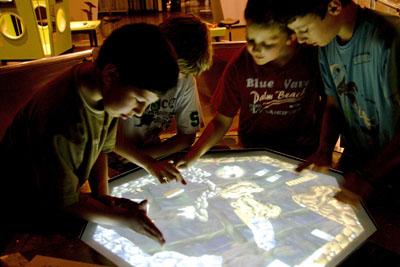PinguTouch
PinguTouch (a.k.a. Table Lemmings) is a casual cooperative game created to make full use of both the social and the interactive possibilities of a computer-supported tabletop system. It uses multi-touch technology to allow simultaneous interaction by multiple users.
The game involves players performing hand gestures on the table surface to aid penguin-like creatures, called pingus, through an obstacle course. Three gestures are implemented: flicking of pingus, pulling of levers, and making bridges or blockades.
T o fully utilize the co-located scenario, PinguTouch encourages close spatial cooperation by employing quasi-modes. Since the number of actions one player can perform at any one point of time are restricted, players must work closely together in a common workspace to succeed in rescuing a large number of pingus. This enables a game environment impossible to recreate in a non co-located scenario.
o fully utilize the co-located scenario, PinguTouch encourages close spatial cooperation by employing quasi-modes. Since the number of actions one player can perform at any one point of time are restricted, players must work closely together in a common workspace to succeed in rescuing a large number of pingus. This enables a game environment impossible to recreate in a non co-located scenario.
To further support interpersonal interaction similar to a typical board game, the visual layout of the game is fashioned in an octagonal form. The "down" direction of the game world leads towards the radius of the octagon, while the "up" direction leads towards its center, thus allowing all users standing around the table easy access to their part of the game world.
PinguTouch was on permanent display at the Industrion (now called the Discovery Museum) in Kerkrade, NL, during their Games—Let's Play! exhibition in 2007.
The system was developed by our student Christian Mattar as part of his Diploma (Master's) thesis. Christian later received the Springorum medal for his outstanding performance in his studies.

